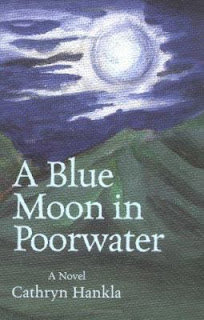Reported by Jeanne
Animals
and Men by art
historian and museum director Kenneth Clark captured the attention of one of
the Nevermore members. A coffee table
type book with glorious illustrations, the book details the relationship
between humans and animals as depicted in works of art, spanning from cave
paintings to classic Egyptian art to Western artists such as da Vinci and
Degas. Our reader was particularly interested in commentary on early art and
totems.
Juvenile
fiction was up next with Lord of the Mountain by Ronald Kidd which tells
the story of the Bristol Sessions through the eyes of thirteen year old Nate
Owens whose minister father takes a very dim view of the music and new
recording technology that so enchants his son.
The reviewer was enjoying this look back at 1927 Bristol and A.P.
Carter, and thought most other readers would like it too.
Before Westeros
made it into print, George R.R. Martin wrote stand-alone science fiction and
fantasy novels such as the one a new Nevermore member chose. Fevre Dream begins in 1857 along the
Mississippi River where steamboat captain Abner Marsh receives an unbelievable business
proposition. Wealthy patron Joshua York
will finance the construction of an elaborate new steamboat which Marsh will
co-own with York. After the new boat is
ready, Marsh begins to notice that York and his friends have some odd behaviors
which include avoiding daylight and it turns out that some suspicions are
well-founded. The book was greatly
enjoyed by our reader who recommended it for all vampire fans.
Actor John
Lithgow has a new illustrated book of verse out entitled Dumpty: The Age of
Trump in verse. The Nevermore member said it covered a number of political
figures and that the illustrations were “a riot.”
Alice
Sebold, author of The Lovely Bones, has an equally dark book in The
Almost Moon. As the book begins,
middle aged divorcee Helen shockingly kills her elderly mother. The rest of the
book explores Helen’s life and relationships, all informed by mental
illness. While the book can be grim at
times, our reviewer said it was a good read and showed how “mental illness
metastasizes to others in a family.”
Blue Moon
in Poorwater by
Cathryn Hankla came out in 1988 but is set in 1968 in an Appalachian mining
town. Ten year old Dorie and her best friend are confronted with a rapidly
changing world, and not just the one of rockets and politics. Dorie was described as a mix between Scout and
Anne Frank, a young girl trying to make sense of the world. Her older brother
has returned, and is seen as some sort of dangerous hippie; her father, a
miner, is fighting for workers’ rights; and Dorie is becoming aware of the
social divide that exists even in a small Virginia town. This book captivated its reader who
proclaimed it to be “better than Where the Crawdads Sing.”
The
enticingly titled Like a Mule Bringing Ice Cream to the Sun drew in
another member who admits she had some doubts before starting this slender
volume. The story centers around Morayo Da Silav, a 74 year old Nigerian woman
living in San Francisco. She’s sophisticated and well-traveled, a retired
English professor was once the wife of an ambassador. Morayo retains her love
of life but an accident threatens to curtail her independence. Our reviewer said that author Sarah Ladipo Manyika
did an excellent job of exploring aging and creating memorable characters.
My Lovely
Wife by Samantha
Downing concerns a couple who share a hobby— serial murder. The book is narrated by the husband who picks
women up in bars, then his wife tortures and murders them. Then the recently killed body of one of their
victims is found, only she should have been killed months ago, leading our
narrator to wonder just how far he should trust his wife. The Nevermore reader said that this book kept
her from moving and that she read the entire book in one day!
In The
Broken Road: George Wallace and a
Daughter’s Journey to Reconciliation, Peggy Wallace Kennedy describes
growing up as the daughter of the staunchly segregationist Wallace. She maintains that some of his rhetoric was
due more to politics than to personal belief and that he attempted to atone for
it later in life. Our reviewer said she
found it interesting, and enjoyed it more than she thought she would.







No comments:
Post a Comment